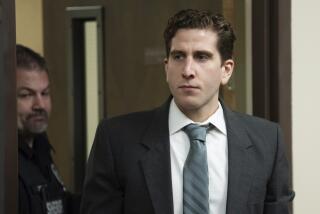Can officers charged in Freddie Gray’s death get a fair trial in Baltimore?
- Share via
Lawyers representing the six Baltimore police officers facing criminal charges in the death of Freddie Gray are seeking to move legal proceedings outside the city, arguing that there is no way the officers can get a fair trial after the intense media coverage and because all residents were affected by a city-wide curfew ordered in response to rioting.
In their request for a change of venue, lawyers said the case had generated a “presumption of prejudice,” making it impossible to pick a jury pool in Baltimore that is untainted by events.
“Based on the relative size and characteristics of Baltimore City, the prejudicial information that has penetrated every form of online, printed and broadcast media, and the short time between the alleged crimes and the trial(s), the presumption of prejudice prevents the Officers in this case from receiving fair trials,” the attorneys wrote.
Gray, a 25-year-old African American, died April 19, a week after he was arrested and transported by Baltimore police. Prosecutors say the officers did not secure him properly to avoid being bounced around in the police van and that they ignored his requests for medical aid. Officials have said that Gray died of injuries related to a severely damaged spine, but have not given details of how the injuries occurred.
Caesar Goodson, the driver of the van used to transport Gray, faces the most severe charges, including “depraved heart” murder, the equivalent of second-degree murder. He is also charged with manslaughter, second-degree assault, two counts of vehicular manslaughter and misconduct in office.
William Porter, Brian Rice and Alicia White face charges of manslaughter, second-degree assault and misconduct in office. Edward Nero and Garrett Miller are charged with second-degree assault and misconduct in office. All of the officers have been charged with reckless endangerment.
The prosecutor’s office has two weeks to respond to the police officers’ filings. It has not said what it will do, but prosecutors are expected to argue that a fair trial is possible in Baltimore.
Seeking a change of venue is a common defense tactic, but such requests are very rarely granted, said Daniel Medwed, professor of criminal law at Northeastern University School of Law in Boston.
In general, courts try to keep trials in the community where the incident occurred because of two general principles, Medwed said. The first is the idea that a defendant should be tried by a jury of his or her peers — those who come from the community where the crime took place. The other is that the harmed community deserves to be the place where justice is decided, he said.
These principles, however, have to be balanced against the defendants’ rights to a fair trial, the outcome of which should be based on evidence rather than the feelings of the jurors about the events, he said.
“Publicity cuts both ways,” Medwed said. “There could be an affinity for the police or jurors could feel that there are special considerations against the defendants because of the high-profile nature of a case that is rife with racial overtones. It could come down to the question of whether the defendants can get a fair trial counter-balancing the community’s right to be heard.”
Complicating the case is what happened after Gray’s death. Initial protests grew in ferocity, eventually leading to rioting hours after his funeral. Hundreds were arrested and the violence caused millions of dollars in property damage. The riots were curbed after officials declared a state of emergency and brought in the National Guard to enforce an overnight curfew.
One comparison could be the Boston Marathon bombing case. Defense lawyers unsuccessfully argued to move the trial of Dzhokhar Tsarnaev, who was convicted of federal charges in the bombing. He is scheduled to be formally sentenced to death this summer.
During the hunt for Tsarnaev and his brother, much of the Boston metropolitan area was ordered to shelter in place, a step below a curfew, but one that still had an impact on the general population. The courts there decided that Tsarnaev could get a fair trial and refused to move the proceedings, but it is unclear if that case is a precedent for the curfew question in Baltimore, Medwed said.
More to Read
Sign up for Essential California
The most important California stories and recommendations in your inbox every morning.
You may occasionally receive promotional content from the Los Angeles Times.














